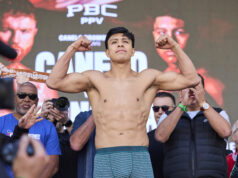By Norm Frauenheim
Oleksandr Usyk, never a man of many words, has had even fewer this week, just days before a sequel that has all of social-media’s usual suspects talking.
But Usyk doesn’t have to say much, if anything, before a rematch full of its own redundancies. His name already says it best.
Oleksandr, which is of Greek origin, means:
To Defend.
It’s a goal as clear as it is risky against Tyson Fury, whose heavyweight resume is a masterpiece collection of adjustments within fights and between them.
To wit: He doesn’t lose rematches.
Then again, neither does Usyk.
That’s about to change Saturday (DAZN) in Riyadh in a rematch perhaps as significant as any in the history of boxing’s fabled flagship division.
Of course, Fury, unlike Usyk, has had a lot to say this week without really saying anything at all.
“The biggest adjustment I’ve made is to grow a beard,’’ Fury said after he arrived in Saudi Arabia to a parade that added a few octaves and exclamation points to what over-the-top means.
Fury has always been better with lyrics and one liners than just anybody in the crowded trash-talking corner of the noisy game. It’s part lousy-lounge act. But it’s also a tactic, one he has used with great effect throughout his heavyweight reign.
After opening bell, his brilliant feint is a weapon. Before opening bell, he weaponizes his words.
It worked against Deontay Wilder, especially in their first rematch when the dangerous Wilder tried to blame the sudden loss of his singular power on fatigue he said he suffered by wearing an armored medieval costume in his ring walk.
Truth is, Wilder didn’t know who the heck he was anymore. He had lost his feared identity, his armor of confidence, on the night Fury got up from his power six years ago in Los Angeles, in a wild draw.
Fury then reminded him of that repeatedly — hauntingly — during the weeks and months before their first rematch — won by Fury in a seventh-round TKO — February 2020 in Las Vegas.
Wilder was embarrassed then. Later, he was destroyed in a concussive conclusion to the trilogy, five knockdowns of violence that ended in Fury winning an 11th-round KO October 2021, also in Vegas.
Fury dominated Wilder, both physically and psychologically, perhaps finishing his career.
The damage done to Fury is still an open question, one that Usyk surely hopes to answer Saturday in the rematch to his contentious split decision over Fury seven months ago.
Fury swears he’s in better condition. He says he went into seclusion in training at a camp in Malta. He says he didn’t speak to his wife for months. She might have been relieved. Just joking, I think. This time, he says he won’t clown around. This time, he says he promises to deliver only pain.
Blah-blah-blah. By now, we’ve heard it all from Fury.
So, too, has Usyk.
A difference, however, is that Usyk, unlike Wilder, doesn’t really listen. At least, he doesn’t appear to react to anything said or sung by Fury. Usyk — poised, patient and menacing — is his own counsel.
Amid everything he didn’t say this week, he had one comment, quotable if you’re the media and perhaps foreboding if you’re Usyk.
“Don’t be afraid,’’ Usyk said at a final news conference that included an unblinking, 12-minute stare-down. “I will not leave you alone.’’
By now, Fury knows that. Since May, I’m guessing he has had dreams of Usyk, always there and always in his face.
In a style that borders on a battle of attrition, the smaller Usyk, stubborn and stealthy, tirelessly works his way inside. It a risk, big enough to be costly for Usyk, especially in the early rounds.
Fury knows that. Fury’s immense advantages in size and power could end this fight before the sixth round. If, however, Usyk is able to push the fight into the seventh, then the eighth and again into the ninth, perhaps he has a chance to finish what he could not in their first fight.
That’s when he hurt a fading Fury badly. He didn’t stop him, although there’s a solid argument that it should have ended, then and there. But a knockdown was ruled, which was enough for Usyk to win on two of the three scorecards.
It was close, but close is when Usyk is at his very best. Fury is best at pulling off the dramatic. Only Fury got up from the full impact of the lethal power in Wilder’s right hand. Only he could survive that right once more, get up all over again and knock out Wilder in a scary third encounter.
Guess here: Each fighter knows the other very well by now. For Usyk, the task is to endure an early assault, then launch one of his own later. For Fury, the test is to end it, close the show as fast as possible.
There’s a temptation to predict that this one ends in a draw. Yes, that’s cynical, but some cynicism is a fight fan’s best defense. Riyadh, Matchroom, Top Rank and DAZN would love a third fight.
A close first fight suggests that the second will be too, which also would probably lead to a trilogy. Neither Usyk nor Fury is young. But they’re not exactly old either. Usyk is 37. He’ll be 38 on Jan. 17. Fury is 36. He’ll be 37 on August 12.
A rematch clause is in place, according to Fury promoter Frank Warren.
“It’s contracted,” Warren told Boxing News. “That will be the case if Tyson wins, providing nobody retires.”
Providing, too, that Usyk, the defending champion, doesn’t do what his name has always told him:
To Defend.








